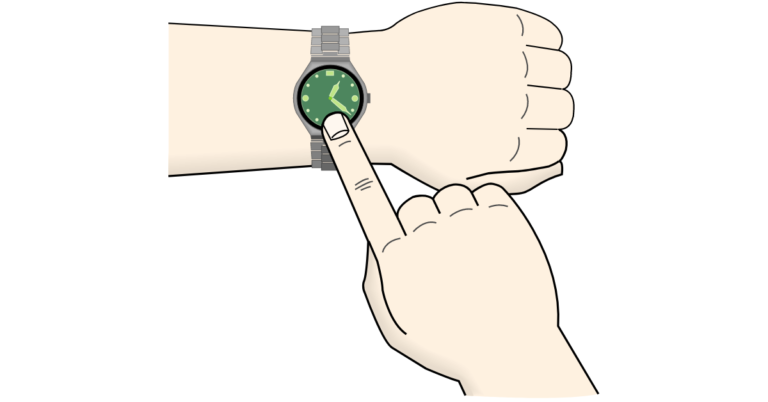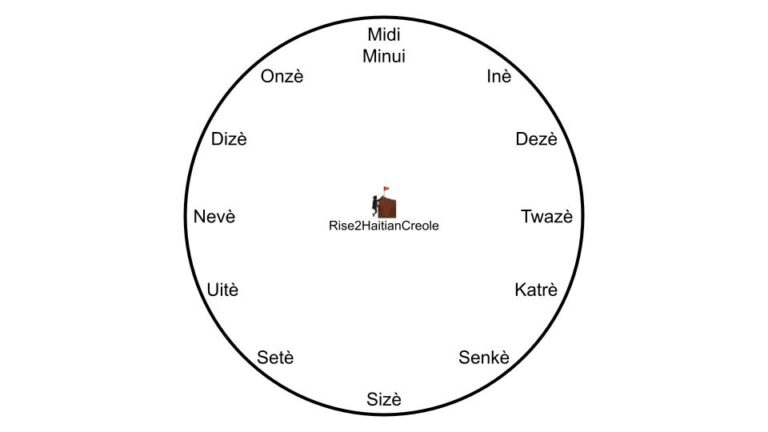
Telling Time in Haitian Creole
Mastering the skill of telling time in Haitian Creole is essential for managing daily activities and understanding the flow of the day.
Word order
Li + Time
A + Time
When to use this type of sentence?
When talking about time
Explanation
It is time to talk about time! Let’s quickly review some Haitian Creole numbers:
1 en
2 de
3 twa
4 kat
5 senk
6 sis
7 sèt
8 uit
9 nèf
10 dis
11 onz
12 douz
When saying the hour, add -è (hour, o’clock). Some hours require a special consonant to bridge the number and -è. (1, 6, 9, and 10 are irregular and change form).
When saying minutes in Haitian Creole, use regular Haitian Creole numbers. You may also hear eka, edmi, mwennka for 15 minutes, 30 minutes, and 45 minutes respectively.
Conjugation:
Hour + Number (Minutes)
1:00 = inè / inè pil
1:05 = inè senk
2:15 = dezè kenz / dezè eka / dezè enka
3:20 = twazè ven
8:30 = uitè trant / uitè edmi
9:35 = nevè trannsenk
10:45 = dizè karannsenk / dizè mwennka
* “# o’clock sharp” is expressed with the words “pil”, “won”, “beng”, “jis”, or “kon boul”.
** Do not use “midi” for 30 minutes. Do not say “dezè midi”. Say “dezè edmi”.
How to ask for time?
How to answer?
Question:
Ki lè li ye?
Ki lè l ye?
= What time is it?
Answer:
Li + Time
Li uitè.
= It is 8 o’clock.
Question:
Akilè + Event + Article?
Ki lè + Event + Article?
Akilè reyinyon an?
Ki lè fèt la?
Akilè asanble a?
Answer:
Event + Article + a + Time.
Li + a + Time
A + Time
Reyinyon an a dizè.
Li a sizè edmi.
A twazè.
Question:
Akilè + Noun + Action?
Ki lè + Pronoun + Action?
Akilè Jan dòmi?
Ki lè li travay?
Akilè klas la kòmanse?
Answer:
Noun + Action + a + Time.
Pronoun + Action + a + Time
A + Time
Jean dòmi a onzè.
Li travay a inè.
A setè.
* Akilè and ki lè are interchageable unless you are asking for the current time
Useful vocabulary
Time + Pou + Time
from a certain time to another
Mwen travay nevè pou senkè edmi.
I work from 9 o’clock to 5:30.
Mwen
to, until, before. You may hear this when talking about 10 to 2 minutes before an hour.
4:55 = senkè mwen senk / senkè mwen
6:50 = setè mwen dis
Haitian Creole
English
Example
Dimaten / Nan Maten
in the morning, a.m.
Setè dimaten
7:00 a.m.
Nan apremidi
in the afternoon, p.m.
Dezè dis nan apremidi
2:10 p.m.
Diswa / Nan Aswè
at night, in the evening, p.m.
Sizè karant nan aswè.
6:40 p.m.
Maten
morning
Nan maten mwen bwose dan m.
In the morning I brush my teeth.
Apremidi
afternoon
Jan gade televizyon nan apremidi.
John watches tv in the afternoon.
Aswè
evening
Nou te chita bò yon dife nan aswè.
We sat around a fire in the evening.
Sware
night
Nou pral pase yon bèl sware ansanm.
We’ll have a beautiful night together.
Anvan + Time
before + time
Mwen travay anvan nevè.
I work before 9 o’clock.
Apre + Time
after + time
Mwen manje apre senkè.
I work before 5 o’clock.
Maten an
this morning
Maten an m te kouri deyò.
This morning I ran outside.
Aswè a
this evening / tonight
Aswè a n ap danse.
Tonight we’ll dance.
